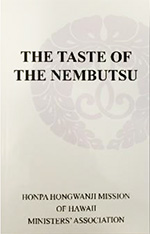
A message from Rev. Kazunori Takahashi which appears in the book, “The Taste of the Nembutsu,” published in 2016 by the HHMH State Ministers’ Association. The book is a collection of dharma messages by each of the active ministers.
To extend the reach of the dharma within these messages, we will publish one per week on our website.
We Have An Umbrella
Rev. Kazunori Takahashi
I have served at Hilo Betsuin for two years. Before I moved to Hilo, some people said to me, “Oh, you are moving to Hilo. Hilo is really nice place, but it rains a lot. Even if you forget lunch, you must not forget an umbrella!” Therefore, my mind was ready for a lot of rain. After I lived in Hilo a while, contrary to my expectation, it didn’t rain too much. However, the second year was really rainy, so some people said to me, “This is the weather of Hilo. Finally, you were able to experience this rain.” I have become accustomed to this continuous rain gradually, and I got wet several times.
After such an experience, I remembered a story. In the history of Japanese Buddhism are famous Nembutsu followers called Myokonin, people who really rejoice in the Nembutsu teaching. Their simple words, poems and episodes make us aware of some important things and inspire us. I would like to share two episodes of Genza (1842-1930), a famous Myokonin.
The first episode occurred on a summer day when Genza worked outside and was caught in a shower. Since he didn’t have an umbrella, he was drenched with rain. He stopped working and left for home. On his way home, he encountered a minister who saw Genza drenched with rain. He said to Genza, “Oh, Genza, you got very wet, didn’t you?” Genza replied, “Yes, thank you very much. How grateful I am that my nose is pointing downwards.”
At first, this conversation might sound strange. However, if our nose point upwards, what is going to happen? The rain would fall into our noses, making us choke and suffer. Genza appreciated that he was able to avoid such a situation, even though he was wet so much. Also, he remembered the value of his nose pointing downwards.
Another episode of Genza took place on another hot summer day when somebody complained to Genza that it was too hot. Then he replied, “If outside is too hot, we have clothes to protect us from heat and sunshine. In case it rains, we have an umbrella. Oyasama always makes everything all right. How can we complain?”
Oyasama literally means our parent, but this word also refers to Amida-Buddha, which is immeasurable life and light. Genza realized that Amida Buddha always supports us, making us aware how every situation can be seen as appropriate even if we encounter some event that we feel unfavorable. Therefore, Genza was delighted that his nose was pointing downwards, and that his clothes and umbrella always provided protection. Thus, Genza always felt Amida Buddha’s compassion which embraces our lives, and was always grateful for everything during his life.
At the beginning, I mentioned the rain in Hilo. When I got tired of continuous rain, I remembered the stories of Genza. It reminded me of what I am provided with. Actually, thanks to the constant rain, Hilo has beautiful greenery and plentiful water. I knew I should appreciate this rain; however, it was hard to remember these facts every time. Even if I understand intellectually that I should appreciate it, and even if I learn from the stories of Genza, I tend to wish sometimes for the rain to stop and for the weather to be fine.
That’s why “Namo Amida Butsu” is essential. When we listen for the Amida Buddha’s compassion, it enables us to reflect on ourselves and causes us to view things differently. We can remember Amida Buddha’s working, while we say “Namo Amida Butsu”. Finally, we can appreciate everything in our daily lives. Shinran Shonin said this as follows.
Those who, hearing Amida Buddha’s Name,
Rejoice in it with reverence and praise,
Receive its treasure of virtues;
The great benefit acquired with one utterance is supreme.
(Hymns of the Pure Land)
The stories of Genza made me think that this continuous rain can remind us of some important things. Even if we forgot an umbrella on a rainy day, let us not forget “Namo Amida Butsu”.
